

Jonny Wilkinson. Michael Phelps. Libby Trickett. Roger Federer. Case studies from different sports – HSC PDHPE. Case studies from different sportsDan Jackson2016-11-26T17:56:33+10:00 The HSC PDHPE syllabus asks you to compare case studies from different sports considering their motivation and psychological strategies.
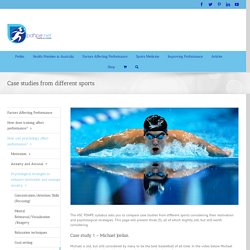
This page will present three (3), all of which slightly old, but still worth considering. Case study 1 – Michael Jordan. Michael is old, but still considered by many to be the best basketball of all time. In the video below Michael talks about his obsession with winning and his goal to play the perfect game. Olympics 2012 - The Importance of Sports Psychology. Learning from coaching stories - Roger Federer, Arsenel Football Team, Mo Farah. Netball Australia. Sport Psychology Case Studies. CASE STUDY: Coping in Professional Sport: A Case Study of an Experienced Cricket Player.
Our research is giving Olympic athletes a competitive edge. Improving coaches' and athletes’ understanding of performance can provide a significant edge in competition.

But the mechanics of sprinting have rarely been examined with truly elite athletes running at high velocities. As a very specific group it's extremely hard to predict their technique based on the performance of lower level athletes. And research into elite athletes' technique is inherently difficult. Athletes and their coaches are often hesitant to participate in research due to fear of making changes to their normal training. Dr Aki Salo’s work with athletes and coaches, and close working relationship with UK Athletics, has allowed him to translate the knowledge he's acquired through his research directly to the very highest level of the sport. Working with the British national men’s 4x100 metre team to investigate relay exchanges, Dr Salo identified the best baton change-over distances in the exchange area, athletes’ running velocity patterns and their interaction with each other.
Preparing to perform under pressure at Rio. If there was one overriding moment that captured the spirit of the last Olympic Games then it would surely be the events on day eight of the competition, Saturday 4 August.
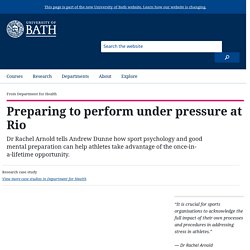
On a balmy August night in London, in the space of just 44 minutes, Jessica Ennis, Greg Rutherford and Mo Farah all struck Gold, adding to a Team GB medal tally that would end up smashing all expectations. That evening would become known as 'Super Saturday'. Pre and Postcompetition Routines of expert coaches of sports teams 1997. Assessing Autonomy-Supportive Coaching Strategies in Youth Sport. Helping youth sport coaches integrate psychological skills in their coaching practice: Qualitative Research in Sport, Exercise and Health: Vol 6, No 4.
Solution-Focused Guided Imagery for a Golfer Experiencing the Yips: A Case Study. Athletic Insight: Back Issues. Volume 7, Issue 1 - March, 2005 Editorial Comparing Sources of Stress in College Student Athletes and Non-Athletes (Gregory Wilson, & Mary Pritchard) - Exploratory study was to identify those stressors identified by Division-I freshmen athletes as most prevalent during their first semester in college.

One intervention that is suggested is to allow student athletes to work in groups so that they can share experiences. Another is to limit weekly practice time for freshmen since one of the most commonly cited sources of stress for freshmen athletes is time. Competitive Attitudes and Egotistical Attributions: Gender Differences While Competing in a Game of Pool (Emily J. Keener) - Examined if gender or skill level are factors in the expression of competitive attitudes and egotistical attributions. Evaluation of Psychological Interventions in Sport and Exercise Settings - Oxford Research Encyclopedia of Psychology.
Alexanders, J., Anderson, A., & Henderson, S. (2015).
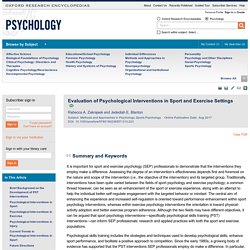
Musculoskeletal physiotherapists’ use of psychological interventions: A systematic review of therapists’ perceptions and practice. Physiotherapy, 101, 95–102.Find this resource: Alkin, M. C., & Christie, C. A. (2004). Anderson, A. Andersen, M. APA Presidential Task Force on Evidence-Based Practice. (2006). The Effects of Psychology on Athletic Performance. Source: article continues after advertisement Negative external or internal psychological factors can lead to mental blocks, causing breaks in focus and preparation, poor performance and, at times, injuries to the athlete.

They can produce physical disruptions such as muscles tightening, shaking and increased perspiration. If not dealt with, these factors may not only affect the athlete but the team as a whole. What Psychological Factors Help Improve Sports Performance? - Exploring your mind. High-performance athletes claim that 90% of their success comes from mental training and ability.

In professional sports, there aren’t huge differences between athletes in terms of potential, training, or physical ability. The determining factors of success, therefore, lie in the psychological realm. Over the years, we’ve seen increased interest in the psychological aspect of sports. This increased interest prompted psychology and sports professionals to ask the following question: what psychological variables determine sports performance? It’s clear that mental factors affect sports performance. “For life’s battles don’t always go to the stronger woman or man, but, sooner or later, the person who wins is the one that thinks they can.”
Psychological factors that impact on training, performance and recovery LIU2 09 295. Psychological Factors Affecting Sports Performance. Sports Psychology: Training Your Brain to Win. How Olympians train their brains to become mentally tough. We have witnessed some exceptional performances during the Pyeongchang Winter Olympics.
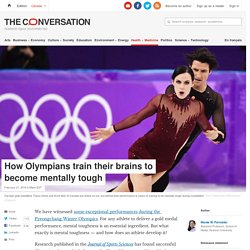
For any athlete to deliver a gold medal performance, mental toughness is an essential ingredient. But what exactly is mental toughness — and how does an athlete develop it? Research published in the Journal of Sports Sciences has found successful Olympians have a high degree of self-confidence, are able to block out distractions, manage their arousal level, are goal-oriented and demonstrate a healthy form of perfectionism. On a personal note, as an Olympian and a registered member with the Canadian Sport Psychology Association, I have used both strategies to enhance my own mental toughness and I now assist athletes as a consultant to develop those skills. 5 Sport Psychology Skills Every Coach Should Know. Leadership One of the most important skills that a coach can develop is personal leadership.
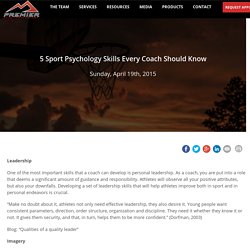
As a coach, you are put into a role that deems a significant amount of guidance and responsibility.